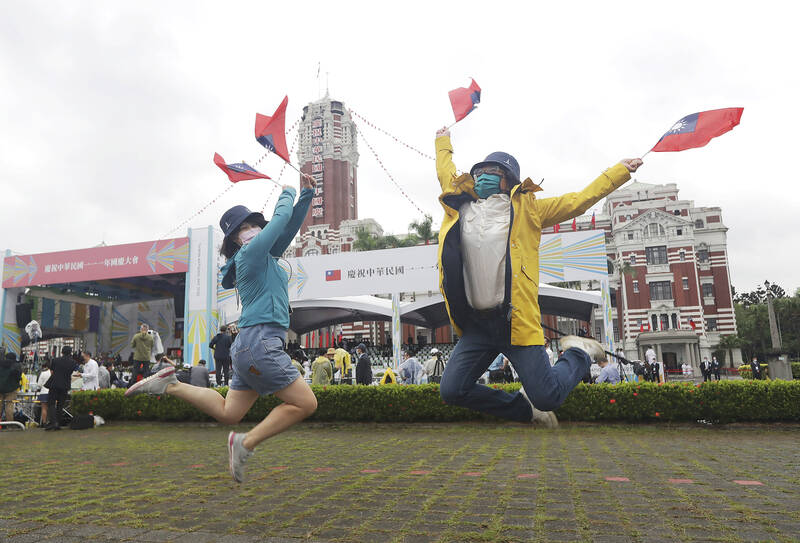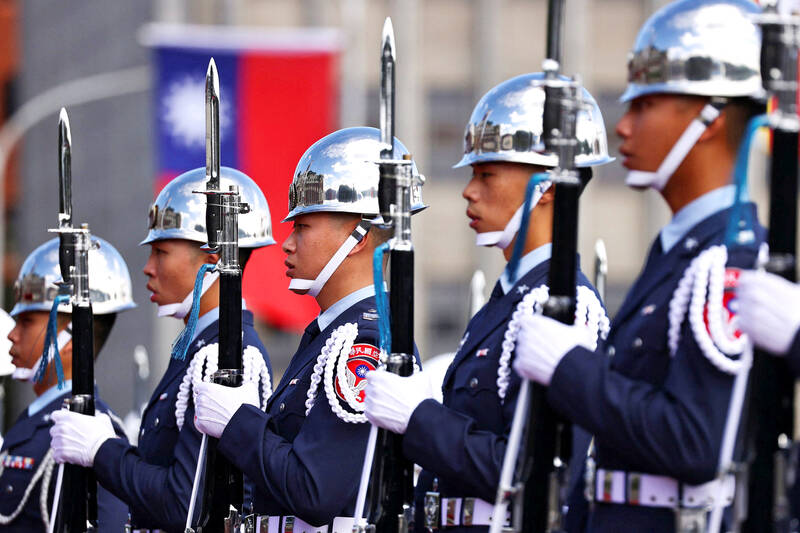For many years in the 1990s I had the joy of working for a consulting firm in Washington DC whose sole client was the prime minister’s office of a major foreign power. Among my responsibilities was covering US energy policy, which meant tracking the climate debacle in the US.
The climate “debate” had some well-defined positions: the scientists and their opposites, anti-science denialists who were largely paid for by fossil fuel firms. Those lines were clear and easy to see. However, there was also a fuzzy “middle,” also close to the fossil fuel industry, that positioned itself as the “reasonable” voice in the center, but who were actually confusionists. Their goals were to sow doubt and delay.
As China militarizes, the debate in the US over what to do about China is shaking out along those lines. There are numerous commentators and observers with a grip on reality, such as Ian Easton, who posted on Twitter recently: “It is no longer a question of if Xi Jinping (習近平) will order the PLA to attack Taiwan. It is now a question of when and how. This threat is like no other.”

Photo: AP
Similarly, in this case the anti-reality denialists are easy to spot: think tankers, Chinese government officials, strange Russian and Chinese assets, obvious people making obviously false arguments that China is not an imperialist state, doesn’t aggress on other nations, it’s all the fault of the perfidious US, all commonplaces of apologetics for Chinese imperialism.
THE CONFUSIONISTS
In between reality and the China denialist extreme lies a gray area inhabited by too many commentators whose focus is on China. Just as with climate confusionists, this rhetoric is positioned as “the sane choice,” “there is still time,” and so on. If read properly, the underlying, plaintive, “but what does this mean for our China?” is clear.

Photo: Reuters
Take Jessica Chen Weiss of Cornell, whose work has been widely circulated in recent weeks, with pieces in Foreign Affairs (“How to Avoid a War Over Taiwan,” Oct. 13) and in the New York Times (“America and China Don’t Need to Knock Each Other Out to Win,” Oct. 19).
Joining Chen Weiss in the Foreign Affairs piece was a cadre of scholars. There were a couple of names I was surprised to see, including that of Bonnie Glaser, director of the Asia program at think tank the German Marshall Fund of the US, and M. Taylor Fravel of MIT.
The Foreign Affairs essay was a classic of confusionist rhetoric, taking apparently reasonable positions, noting China’s militarization, asking both sides to provide “assurances.” But terms such as “mainland” China and Taiwan’s “permanent separation” are clear tells, terminology Chen Weiss has used elsewhere.
Another giveaway: the piece does not clearly delineate the US position on Taiwan. If you don’t make it clear that Taiwan is not part of China under both international law and US policy (and history!), you can get your readers to accept that perhaps China’s position has something for it.
The group argued that deterrence requires signaling both threats and assurances to the target state.
“The assurance requires conveying to the target, in a way that it can trust, that it will not be taken advantage of if it refrains from taking the proscribed action,” they said. Trust? Beijing does not even trust its own citizens, let alone foreign powers opposed to its expansion.
The piece was straight out of 2004, arguing, hilariously, that Taiwan must be prevented from “declaring independence,” though Democratic Progressive Party (DPP) officials have been publicly announcing that Taiwan is an independent state for over two decades now (it’s not independence, which we already have, but recognition, that Taiwan wants).
“Triangular deterrence,” it claims, “has succeeded for over 40 years in keeping the peace across the Taiwan Strait.” No, what kept the peace was the gross disparity in fighting power between the US-Japan-Taiwan alliance and China. It’s not a coincidence that once that disparity disappeared suddenly war looms.
A HISTORY LESSON FOR APOLOGISTS
Any position that is not rooted in this history is broken from the beginning. Indeed, as all China apologetics do, it largely attributes the changes in the cross-strait relationships to US actions and of course, to the Taiwanese for wanting to live in an independent democracy like all the writers of that piece do.
The Foreign Affairs cadre argued that to assure Beijing, Washington has to say “it does not support independence for Taiwan, that it opposes any unilateral change to the status quo by either side and that it will accept any outcome that is peacefully agreed to by mainland [sic] China and Taiwan.”
The writers concede that Washington has long done exactly that. They then argue that Washington has moved away from that in recent years. Yes, of course, because Beijing has not responded positively to 40 years of assurances. D’oh. This has forced US thinkers to call for different policies.
During the whole period of Beijing’s military modernization, Washington followed the policy that the Foreign Affairs cadres tells us we should return to. In fact, we repeated it again and again for decades, like frenzied cartoon characters on looped animation. Look how effective it was in reassuring Beijing. Imagine if we hadn’t been doing that, how big Beijing’s military buildup might have been!
The reason that calls for reassurance are pointless is because (1) no one can trust Beijing’s assurances (see PRC, history of), (2) we did that for decades and it failed miserably and (3) there is no reassurance that Beijing will accept short of actual possession of Taiwan.
Further, deterrence by its very nature undermines any possibility of assurance. Every resource committed to Taiwan’s defense is a resource committed to keeping Beijing from annexing it. It is thus the height of incoherence to call for assurances to Beijing while calling for stronger US alliance links and military investments in East Asia. Choose one, because Beijing is not that stupid.
Indeed, the search for ways to give assurances to China simply hands it leverage over US policy. The Chinese are never expected to give credible assurances to us (the Foreign Affairs piece calls for them, but they require no serious departure from anything Beijing has done, lack concreteness and impose no costs on Beijing. Our China must not be harmed or asked to make real sacrifices).
It’s simple: the US interest is to keep Taiwan out of Beijing’s hands, it wants to avoid a future of constant gray zone warfare across the Pacific with occasional irruptions of outright hot war as China attempts to grab more territory from its neighbors and to expand the reach and position of its insatiable fishing fleets.
For 40 years it was easy to keep Taiwan a de facto independent state. Now it’s hard, and everyone in Taiwan, Japan and the US who has a grip on reality is moving toward the same policy: re-armament. Yesterday. Departures from and variations on this should generally be regarded as forms of denialism.
What is Chen Weiss’ real position? While arguing for “reasonable” positions in recent publications, a couple of weeks ago she tweeted out: “The United States has a strategic interest in the peaceful resolution of differences across the Taiwan Strait, not in Taiwan’s permanent separation or independence.”
Chen Weiss’ position is the same as Xi Jin-ping’s: Taiwan is part of China.
Confusing, isn’t it?
Notes from Central Taiwan is a column written by long-term resident Michael Turton, who provides incisive commentary informed by three decades of living in and writing about his adoptive country. The views expressed here are his own.

Jacques Poissant’s suffering stopped the day he asked his daughter if it would be “cowardly to ask to be helped to die.” The retired Canadian insurance adviser was 93, and “was wasting away” after a long battle with prostate cancer. “He no longer had any zest for life,” Josee Poissant said. Last year her mother made the same choice at 96 when she realized she would not be getting out of hospital. She died surrounded by her children and their partners listening to the music she loved. “She was at peace. She sang until she went to sleep.” Josee Poissant remembers it as a beautiful

For many centuries from the medieval to the early modern era, the island port of Hirado on the northwestern tip of Kyushu in Japan was the epicenter of piracy in East Asia. From bases in Hirado the notorious wokou (倭寇) terrorized Korea and China. They raided coastal towns, carrying off people into slavery and looting everything from grain to porcelain to bells in Buddhist temples. Kyushu itself operated a thriving trade with China in sulfur, a necessary ingredient of the gunpowder that powered militaries from Europe to Japan. Over time Hirado developed into a full service stop for pirates. Booty could

Before the last section of the round-the-island railway was electrified, one old blue train still chugged back and forth between Pingtung County’s Fangliao (枋寮) and Taitung (台東) stations once a day. It was so slow, was so hot (it had no air conditioning) and covered such a short distance, that the low fare still failed to attract many riders. This relic of the past was finally retired when the South Link Line was fully electrified on Dec. 23, 2020. A wave of nostalgia surrounded the termination of the Ordinary Train service, as these train carriages had been in use for decades

Lori Sepich smoked for years and sometimes skipped taking her blood pressure medicine. But she never thought she’d have a heart attack. The possibility “just wasn’t registering with me,” said the 64-year-old from Memphis, Tennessee, who suffered two of them 13 years apart. She’s far from alone. More than 60 million women in the US live with cardiovascular disease, which includes heart disease as well as stroke, heart failure and atrial fibrillation. And despite the myth that heart attacks mostly strike men, women are vulnerable too. Overall in the US, 1 in 5 women dies of cardiovascular disease each year, 37,000 of them